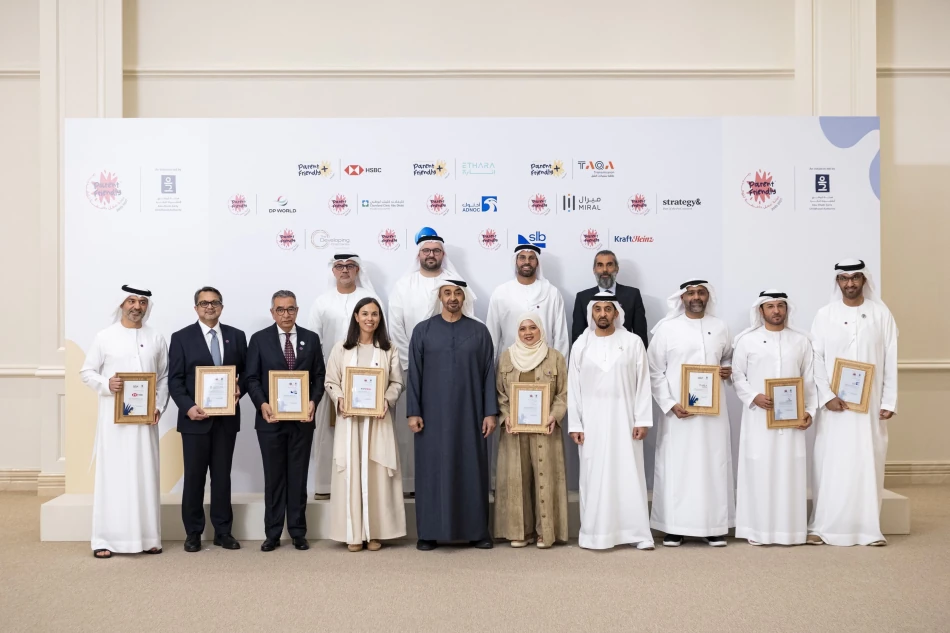
UAE Leader Honors Employers Providing Family-Friendly Workplaces with 'Parent-Friendly' Quality Mark
UAE President Champions Family-Friendly Workplace Revolution as Economic Strategy
UAE President Sheikh Mohammed bin Zayed Al Nahyan has positioned family stability as a cornerstone of national development, personally honoring organizations that create parent-supportive work environments. This high-level endorsement signals the UAE's strategic pivot toward workplace policies that balance professional ambitions with family responsibilities—a move that could reshape the Gulf's competitive advantage in attracting global talent.
Presidential Recognition Elevates Workplace Culture Initiative
During a ceremony at Al Bahar Palace in Abu Dhabi, Sheikh Mohammed bin Zayed honored institutions receiving the "Quality Mark for Parent-Supportive Work Environment" in the program's third cycle. The initiative, launched by the Abu Dhabi Early Childhood Authority, represents more than corporate social responsibility—it's becoming a measurable standard for institutional excellence in the Emirates.
The President emphasized that supporting family cohesion directly contributes to raising "conscious generations" who maintain their identity while contributing effectively to the nation's comprehensive development journey. This framing connects workplace policy to national identity preservation, a recurring theme in UAE governance.
Strategic Workforce Implications
Talent Retention in a Competitive Market
The UAE's focus on parent-friendly workplaces addresses a critical challenge in its expatriate-heavy economy. With over 80% of the population being foreign nationals, many of whom are working parents, creating supportive environments could significantly impact talent retention rates. This becomes particularly relevant as regional competitors like Saudi Arabia and Qatar intensify their own talent acquisition strategies.
Economic Diversification Through Human Capital
By institutionalizing work-life balance, the UAE appears to be investing in long-term productivity gains. Research consistently shows that parent-supportive policies reduce employee turnover costs and increase engagement levels—factors crucial for an economy transitioning from oil dependence to knowledge-based industries.
Regional Leadership in Progressive Workplace Policy
The UAE's approach mirrors successful models in Singapore and Nordic countries, where government-backed family-friendly policies have contributed to economic competitiveness. However, the Emirates' version carries unique characteristics, emphasizing cultural values and national identity alongside professional development.
This initiative also positions the UAE ahead of regional peers in addressing demographic challenges. As Gulf states grapple with aging populations and declining birth rates, workplace policies that support family formation become economically strategic, not merely socially progressive.
Implementation and Market Response
The program's third cycle suggests sustained momentum, with the President noting "increasing response levels" from targeted institutions. This growing participation indicates that organizations view the quality mark as valuable for their reputation and operational efficiency.
For multinational corporations operating in the UAE, this presidential endorsement likely signals that family-supportive policies will become increasingly important for regulatory compliance and public relations. Companies may need to reassess their regional strategies to align with these evolving expectations.
Broader Implications for Gulf Development Models
The high-profile nature of this initiative—attended by numerous royal family members and senior officials—demonstrates the UAE's commitment to positioning itself as a regional leader in progressive governance. This approach could influence policy discussions across the Gulf Cooperation Council, particularly as member states compete for foreign investment and skilled workers.
The emphasis on balancing "parenting responsibilities with professional life requirements" reflects a sophisticated understanding of modern workforce dynamics. As the UAE continues its transformation into a global business hub, such policies may prove essential for maintaining its competitive edge in attracting and retaining the human capital necessary for sustained economic growth.
Most Viewed News

 Sara Khaled
Sara Khaled






